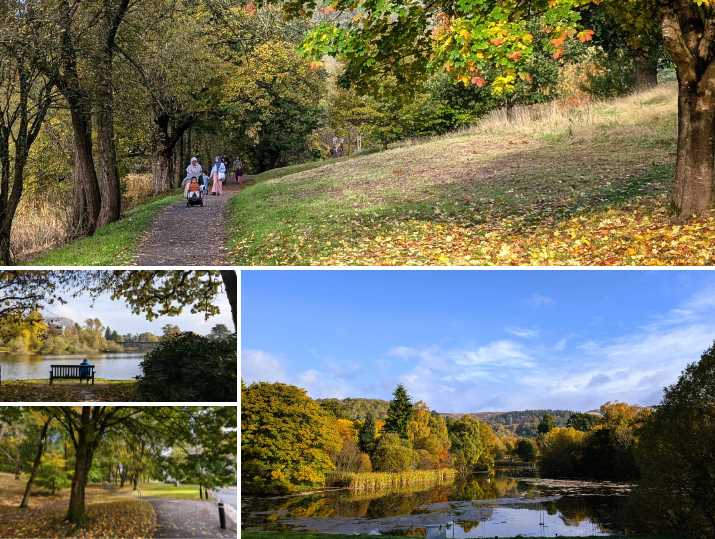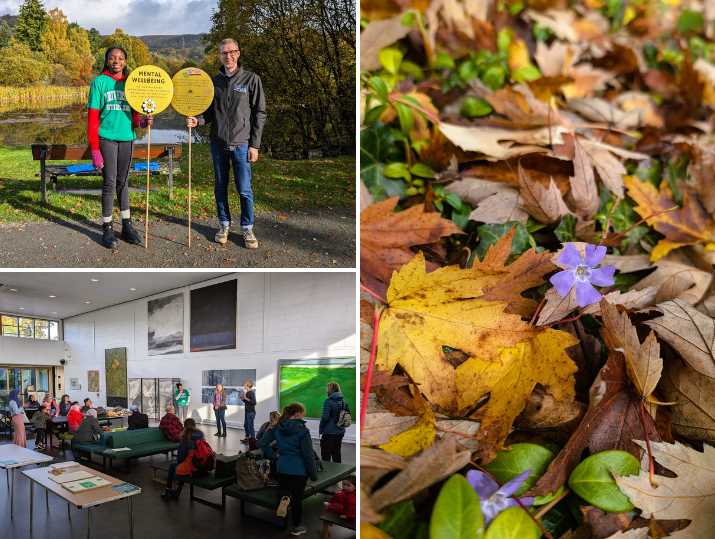We welcomed members of the public to the Science of Steps engagement event on Saturday, 19th October at the University of Stirling campus to discover the benefits of everyday physical activity. The special weekend event was part of the Economic and Social Research Council (ESRC) Festival of Social Sciences.
Designed and led in partnership with the University of Stirling, University of St Andrews and our Workplaces team at Paths for All, the event combined scientific research with nature connectedness, and outdoor activities.
We welcomed a diverse group of attendees including young students, families and research experts to enjoy a self-led walk, suitable for those walking or wheeling, around the University of Stirling's picturesque loch. Throughout the event, visitors learned about insights from groundbreaking research and our national Step Count Challenge focusing on workplace activity and wellbeing.
The ESRC Festival of Social Science is an annual celebration, with over 300 events delivered by universities across the UK. The events explore social sciences, how our society is transforming local areas, shaping behaviours to tackle climate change, and specifically during this year's event, the relationship between humans and digital technologies.
Putting research into practice, event participants were encouraged to explore the University of Stirling campus with a leisurely lap of the loch and surrounding areas, enjoying the opportunity to connect with the local wildlife and the autumnal colours of the campus woodlands. Staff and students from the Universities of Stirling and St Andrews, as well as our team, were positioned along the route to share how small changes in daily activity can make a significant difference to health and wellbeing.

Additionally, our acclaimed artist-in-residence, Alec Finlay, was on hand to encourage and guide visitors to connect with nature and their senses with a “nature compass”. Attendees were invited to immerse themselves in the natural environment during their circular route and create their own nature compass, combining creativity with outdoor activity.
Carl Greenwood, our Schools and Workplaces Manager said,
The event showcased how simple changes to our daily routines can transform our wellbeing. With autumn now here, the University of Stirling's stunning campus provided the perfect backdrop for people to experience firsthand how walking can benefit both physical and mental health.
We know from our Step Count Challenge that workplace walking initiatives create lasting positive changes, and we're excited to have had the opportunity to share these insights with visitors, while enjoying the natural environment around us.
Researchers from the Universities of Stirling and St Andrews were on hand to discuss the research findings about our successful Step Count Challenge, which supports workplace teams across Scotland to become more active. Dr Sam Warne from the University of St Andrews has worked alongside our Workplaces team to explore the impact of our Step Count Challenge on the physical and mental wellbeing of participants.
Sam’s research, explored and collated during his PhD, found that across three studies from the eight-week spring challenge, four-week autumn challenge and an additional Bespoke Challenge, participant physical fitness scores increased between 11.6% and 14.5% over the duration of the challenges. Similarly, a positive increase in mental wellbeing was found with an 11% improvement seen in participant scores on the Warwick-Edinburgh Mental Wellbeing Scale (developed to enable the monitoring of wellbeing in the general population).

One event attendee from a research background said,
So refreshing to attend a public engagement event that wasn't death-by-PowerPoint! Learning about research into the benefits of walking whilst walking through woods around a loch worked on several levels. A good turnout from a diverse group of people on a stunning autumn day.
Another participant said,
I am generally really sedentary working from home. It was wonderful to hear about the benefits of walking while walking around this beautiful campus.
Professor Gozde Ozakinci from the University of Stirling said:
Our findings from a large number of Step Count Challenge participants can provide a motivation for others to try to do a bit more physical activity than they are used to.
This unique initiative by Paths for All and our research collaboration led to original and significant research to be carried out and showed that Step Count Challenge in workplaces can make positive impact on physical and mental health. Participants also told us that this initiative helped them overcome barriers to physical activity.
The Science of Steps event in our University of Stirling campus was a perfect opportunity for us to share the findings in an enjoyable, accessible and creative way. We had a great audience turnout, with visitors from a broad range of ethnicities, ages and walks of life coming along to learn, explore and create.
The event showed that being physically active doesn't require intense exercise or gym memberships. Instead, simple activities like walking or wheeling during the working day can lead to improved fitness, wellbeing, and social connections. Positively still, taking part in physical activity outdoors in greenspaces such as local parks can significantly boost the benefits of health and wellbeing.
To explore what our national Step Count Challenges can offer you, visit the website here.
To learn more about our support for workplaces, visit our dedicated page here.


